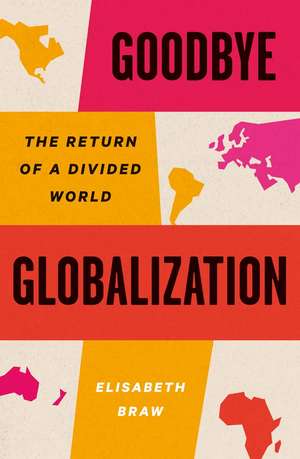Goodbye Globalization: The Return of a Divided World
Autor Elisabeth Brawen Limba Engleză Hardback – 13 feb 2024
A bold new account of the state of globalization today—and what its collapse might mean for the world economy
After the Cold War, globalization accelerated at breakneck speed. Manufacturing, transport, and consumption defied national borders, companies made more money, and consumers had access to an ever-increasing range of goods. But in recent years, a profound shift has begun to take place.
Business executives and politicians alike are realising that globalization is no longer working. Supply chains are imperilled, Russia has been expelled from the global economy after its invasion of Ukraine, and China is using these fissures to leverage a strategic advantage. Given these pressures, what will the future of our world economy look like?
In this groundbreaking account, Elisabeth Braw explores the collapse of globalization and the profound challenges it will bring to the West. Drawing on interviews with prominent executives and policymakers from around the world, Braw poses the difficult questions all businesses and economies will face—and traces the intricate story of globalization from the exuberant ’90s to the embattled present.
Preț: 137.94 lei
Nou
Puncte Express: 207
Preț estimativ în valută:
26.40€ • 27.69$ • 21.97£
26.40€ • 27.69$ • 21.97£
Carte disponibilă
Livrare economică 11-25 martie
Livrare express 25 februarie-01 martie pentru 34.50 lei
Preluare comenzi: 021 569.72.76
Specificații
ISBN-13: 9780300272277
ISBN-10: 0300272278
Pagini: 336
Ilustrații: 17 color illus.
Dimensiuni: 152 x 235 x 31 mm
Greutate: 0.6 kg
Editura: Yale University Press
Colecția Yale University Press
ISBN-10: 0300272278
Pagini: 336
Ilustrații: 17 color illus.
Dimensiuni: 152 x 235 x 31 mm
Greutate: 0.6 kg
Editura: Yale University Press
Colecția Yale University Press
Recenzii
2024 CHOICE Outstanding Academic Title
“Braw excels herself in this book. Sharply illustrated with real-life examples and vivid character sketches, closely argued and clearly written, she outlines the dangers unthinking globalisation created for our domestic cohesion and national security – and plots a path back from the brink.”—Edward Lucas, author of The New Cold War
“Braw writes with long-established research authority and great personal wit, tracing the way so many optimistic expectations have been redefined; events and trends that leave us, indeed, with a new world to fashion as best we can. It’s the story of our era, and Elisabeth Braw tells it beautifully.”—Michael Clarke, author of The Challenge of Defending Britain
“Braw has crafted a gem of a book, a trenchant, big-hearted account of the helter skelter history of globalisation, its slippery rise and apparent fall. Who shaped it, how did it lose its steam? Goodbye Globalization is peopled with hucksters and schemers but also philanthropists. . . . A fantastically eclectic cast of interview partners give insights into how it all went wrong.”—Roger Boyes, diplomatic editor of The Times
“Braw has brilliantly explained the challenges we face now and in the coming years. We, the West, must get organized, strengthening our alliances while also strengthening our own national resilience in order to protect what has made us secure and prosperous. Elisabeth has shown us how.”—Lt Gen (ret.) Ben Hodges, former Commander General of United States Army Europe
“The idea of mutual dependency between liberal democracies and authoritarian states brought money to some, but war and misery to many. Elisabeth Braw brilliantly analyses the causes behind the current global turmoil. Unfortunately more are set to come due to these misjudgements. Read this book and buckle up.”—Artis Pabriks, former deputy prime minister of Latvia
“Braw excels herself in this book. Sharply illustrated with real-life examples and vivid character sketches, closely argued and clearly written, she outlines the dangers unthinking globalisation created for our domestic cohesion and national security – and plots a path back from the brink.”—Edward Lucas, author of The New Cold War
“Braw writes with long-established research authority and great personal wit, tracing the way so many optimistic expectations have been redefined; events and trends that leave us, indeed, with a new world to fashion as best we can. It’s the story of our era, and Elisabeth Braw tells it beautifully.”—Michael Clarke, author of The Challenge of Defending Britain
“Braw has crafted a gem of a book, a trenchant, big-hearted account of the helter skelter history of globalisation, its slippery rise and apparent fall. Who shaped it, how did it lose its steam? Goodbye Globalization is peopled with hucksters and schemers but also philanthropists. . . . A fantastically eclectic cast of interview partners give insights into how it all went wrong.”—Roger Boyes, diplomatic editor of The Times
“Braw has brilliantly explained the challenges we face now and in the coming years. We, the West, must get organized, strengthening our alliances while also strengthening our own national resilience in order to protect what has made us secure and prosperous. Elisabeth has shown us how.”—Lt Gen (ret.) Ben Hodges, former Commander General of United States Army Europe
“The idea of mutual dependency between liberal democracies and authoritarian states brought money to some, but war and misery to many. Elisabeth Braw brilliantly analyses the causes behind the current global turmoil. Unfortunately more are set to come due to these misjudgements. Read this book and buckle up.”—Artis Pabriks, former deputy prime minister of Latvia
Notă biografică
Elisabeth Braw is a senior fellow with the Atlantic Council’s Transatlantic Security Initiative and a senior associate fellow at the European Leadership Network. She is a columnist with Foreign Policy and Politico Europe, where she writes on national security and the globalized economy, and is the author of God’s Spies and The Defender’s Dilemma.
Descriere
A bold new account of the state of globalization today—and what its collapse might mean for the world economy
